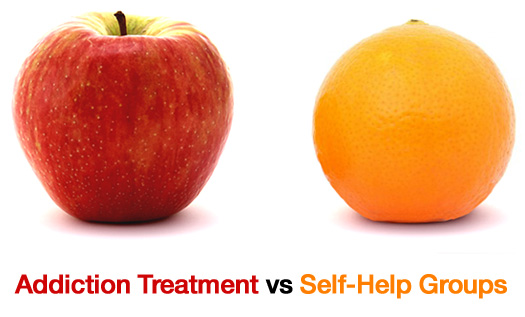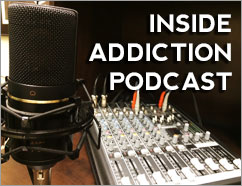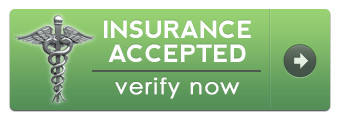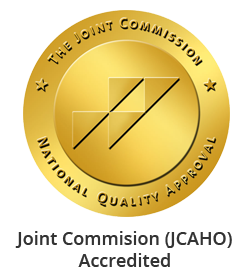The saying goes that an apple a day keeps the doctor away. However, everyone knows that oranges are an excellent source of the vitamin C our bodies need. So which is better? The debate about addiction treatment facilities versus self-help groups is much the same.
The differences between addiction therapy and self-help support groups are vast, but first, here is some noteworthy information:
- Treatment for addiction reduces drug and alcohol use up to 60 percent, suggests the National Institute on Drug Abuse (NIDA)
- Data shows that support communities, groups generally based on the 12-step model, like Alcoholics Anonymous (AA), Narcotics Anonymous (NA) and Self Management and Recovery Training (SMART recovery) can complement and extend treatment efforts
- Every $1 invested in addiction treatment saves $7 in crime related costs, and if healthcare related costs are included, the return increases to $12
- Only 1 in 10 of the 23.5 million people in the United States suffering from addiction receive treatment
12-step support groups, such as AA and NA, follow a spiritual guideline for recovery. These programs suggest that addicts are helpless over their addiction and must rely on a power greater than themselves in order to get and maintain their sobriety. There are also non-religious support groups, such as SMART Recovery. This cross-talk support group is based in science and uses cognitive behavioral therapy (CBT) to work toward recovery.
Probably the most beneficial aspect of support groups is that an individual trying to achieve sobriety can see that they’re not alone in their struggles and experiences. However, it’s widely accepted that support groups are not a substitute for addiction treatment.
“You don’t treat a chronic illness for four weeks and then send a patient to a support group. People with a chronic form of addiction need multimodal treatment that is individualized and is offered continuously or intermittently for as long as they need it,” says Dr. Mark Willenbring, former director of the National Institute for Alcohol Abuse (NIDA), in a New York Times interview.
Requirements for Proper Treatment of Addiction
Here’s a list of some of the requirements that the American Society of Addiction Medicine (ASAM) deem necessary for the proper treatment of addiction:
- A qualified professional is in charge of the overall care of the patient, and does a thorough evaluation, including diagnosis, the severity of the illness, as well as examining any underlying medical, psychiatric, social and interpersonal problems
- Based on the evaluation, an individualized treatment plan is created using accepted practice guidelines, and treatment is overseen and guided over time
- Not only is the qualified professional and program responsible for treatment, but they should also be able to refer the patient to additional services as needed, as well as continue therapeutic contact, if possible, until a stable recovery has been achieved
The unfortunate truth is that most people spend more time researching what car they’re going to buy than what type of treatment is best suited for them or a loved one. Science writer Anne M. Fletcher, author of the books “Inside Rehab” and “Sober For Good,” suggests individuals first, “…get an independent assessment of the need for treatment, as well as the kind of treatment needed, by an expert who is not affiliated with the program you are considering.”
While support groups, both 12-step and science-based alternatives, can be a useful supplement, they are not the same as addiction treatment. Careful thought and consideration should go into choosing a qualified treatment program that fits with a person’s belief and goals. After all, the goal is long-term recovery.






